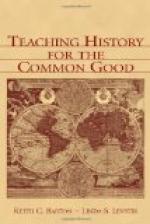III. THE ASSIGNMENT OF THE LESSON
1. Careful assignment will reveal to the student the relation of geography and history
2. His power of analysis and criticism will be stimulated
3. The conditions in other countries will add to his comprehension of the facts in the lesson
4. His disposition to study intensively will be encouraged
5. His acquaintance with the great men and women of history will be vitalized
6. He will correlate the past and the present
7. He will be required to memorize a limited amount of matter verbatim
8. Methods of preparing questions assigned in advance
IV. THE METHOD OF THE RECITATION
1. Assumptions as to the recitation room
2. What the teacher should aim to accomplish
3. Work at the blackboard
4. Special reports
5. Fundamental principles of good questioning
6. Some additional suggestions for teachers of history
V. VARIOUS MODES OF REVIEW
1. The place of drill in the history recitation
2. Good reviews will develop a knowledge of the sequence of events
3. They will give a view of the whole subject
4. They will insure a better acquaintance with great men and women
5. They will be economical of time
6. They will secure fluency
7. What the student may do with “problems” in history
VI. THE USE OF WRITTEN REPORTS
1. The purpose of theme work should change as the course continues
VII. EXAMINATIONS AS TESTS OF PROGRESS
1. The examination should determine how much the student has progressed
2. Specific suggestions on formulating questions



